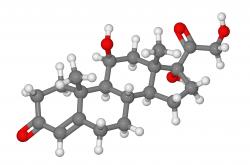Cortisol, Your Adrenals, and the War on Stress
The hormone cortisol plays an important part in human body. Learn about the different ways cortisol protects you from harm and how cortisol imbalances can be damaging to your health.

It is important to understand the way that hormones impact all of the body’s systems to ensure that everything remains in proper balance. And when it comes to hormones, there are none more essential for stress management and sound health than cortisol.
Cortisol is manufactured and secreted by the adrenal cortex, in the zona fasciculata. It is responsible for regulating the rate at which proteins, fats, and carbohydrates are metabolized, which in turn ensures that blood sugar levels remain in balance during times of both normal and extreme stress. In fact, the release of cortisol is the mechanism by which the body responds to a variety of different stressors in an attempt to protect itself from harm.
The Protective Role of Cortisol
Most people never stop to think about just how vulnerable the human body can be to stress. There are so many different stressors at play during any given day that the body could never hope to adapt and withstand the pressure without some organized system for defending itself. Cortisol is the adrenal glands’ primary foot soldier in its ongoing war on stress.
Because of that fact, this hormone is forced into action in a variety of different protective roles. Just consider the following:
- Cortisol is responsible for regulating the amount of glucose in the body by managing its production levels, and safeguards cellular health against the damage that can be caused when insulin levels are too high.
- Cortisol protects your liver by ensuring a normal balance of blood sugar. It does this by helping to convert fats and proteins into the fatty acids and amino acids so necessary for good health.
- Cortisol protects your cells by helping to normalize the production of lymphocytes. It provides the protection your body needs from overactive white blood cells that would otherwise damage tissue.
- Cortisol regulates your blood pressure, maintains proper fluidic levels, and protects your heart.
- Cortisol strengthens and normalizes the functions of the brain and central nervous system. This helps with emotional control, memory, and mental focus.
- Cortisol provides anti-inflammatory effects for damaged tissue.
Cortisol and the Regulation of Insulin
One of cortisol’s primary functions is to act as a counter to insulin, in an effort to ensure that glucose is actually used as fuel rather than being stored. That insulin, if left unchecked, would promote the storing of glucose even when the body has no real immediate need for it. When blood sugar levels are too high, more insulin is released by the beta cells in the pancreas, which leads to elevated glucose - much of which ends up being stored in fat cells.
Cortisol’s role in this process is complex as well. Though it does stimulate the liver’s process of making new glucose, it also serves as an inhibitor to insulin, and prevents the latter hormone from following its natural inclination to store excess glucose. It is important to keep in mind that, under normal circumstances, this planned suppression of insulin’s effect is a response to stress. Obviously, when cortisol levels remain too high for extended periods of time, that suppression of insulin can result in other health complications. But at the proper levels, cortisol’s relationship to insulin and its work at balancing sodium and potassium levels are absolutely critical to maintaining a healthy body.
Cortisol and Blood Sugar Levels
The importance of cortisol in the production of glucose and the maintenance of healthy blood sugar levels cannot be overstated. From a physiological standpoint, cortisol is responsible for triggering the enzymes necessary for glucose production, even as it stimulates the liver’s synthesis of glycogen. In other words, it is involved in producing the very thing that elevates blood sugar, while at the same time controlling the production of the glycogen that lowers blood sugar levels. This dual responsibility provides cortisol with the ability to better regulate the total amount of glucose in the bloodstream at any given time.
When blood sugar levels decrease, the adrenals are called upon to produce additional cortisol. That hormone then uses its role as a converter of fats and proteins to create the glucose the body needs to normalize blood sugar. The process, known as gluconeogenesis, involves converting fats into the more usable fatty acids, and breaking down proteins into the amino acids (peptides) the body needs for normal function. That process is one that is ongoing throughout each day, as blood sugar rises and falls from moment to moment and hour to hour.
Since glucose is the most common energy used for bodily functions, maintaining the correct level of blood sugar at all times is a vitally important function. When stress rises for any reason, that function becomes magnified by the need for additional glucose. Stress pressures the body in ways that quickly deplete glucose stores. If this hormone was unable to perform its natural role as a glucose production stimulator, the body would have no viable means for dealing with the increased demands placed upon it by severe stress.
Cortisol and Your White Blood Cells
When injury or illness strikes and immune system’s army of white blood cells springs to the body’s defense, cortisol is called into action as well. White blood cells are, of course, an absolutely critical component of the immune response. As such, they have a vital role to play in dealing with what they see as infectious invaders, and ensuring that the body has a chance to heal itself. The problem is that the white blood cell army is one that can easily become far too zealous in defense of the body, and ends up actually attacking the body. Left unchecked, they can cause tremendous harm.
That’s because the various white cells used during the immune response usually seek to overwhelm any perceived invaders with an overpowering array of chemicals. It is these chemicals that are responsible for the inflammation and redness that you see surrounding any damaged tissue. They lymphocytes, which lead the white blood cell defense, have no inherent ability to moderate the usage of these chemicals. As a result, many of these white blood cells end up remaining on site, and continue to release their chemicals even after the need has passed.
Cortisol exercises a restraining role on the lymphocytes and other white blood cells by effectively chasing the excess cells away from the area. That helps to mitigate the damage they might otherwise do during the immune response, by preventing the type of tissue destruction that an excessive number of white blood cells can cause. This hormone is also responsible for hastening the natural death cycles of lymphocyte cells, as it works to gain control over the affected area.
Cortisol and Your Heart
Given its importance, it should come as no surprise to learn that cortisol is also vital for the cardiovascular system. As it courses through the arteries, cortisol tends to cause them to contract. This constriction occurs as a means for ensuring that more oxygen and nutrients are delivered to needed areas of the body during moments of high stress. Since this elevates blood pressure, it is obviously not a condition that should be considered normal. Left unchecked, stress that causes these high levels of cortisol on a consistent basis can lead to the type of arterial damage that often results in heart attacks.
In normal times, however, cortisol’s impact on the heart is quite beneficial. Since potassium and sodium are both so vital for good heart health, cortisol’s regulation of the two minerals is critically important. Potassium, along with calcium, serves to enhance the contractions in the heart, prevent cramping of those muscles, and ensures that the organ continues to beat in a regular and smooth manner. At the same time, they work to counteract the arterial contraction that cortisol can cause.
Cortisol and Your Central Nervous System
Research has indicated that cortisol has an impact on a number of other areas of the human body as well – including mood and behavior. When cortisol levels are excessively higher or lower than the normal range, researchers have noted changes in patient behavior. These can include things like extreme alterations in sleeping patterns, and even increased agitation and excitability. Mood swings can become more pronounced, and critical thinking can become impaired. Even memory can be impacted.
All of these are indications that the central nervous system is directly affected by any imbalance in cortisol levels. When patients suffering from chronic levels of high stress are observed, there are dramatic alterations in the pattern of electrical activity in their brains’ neurons. These changes can lead to various forms of dementia, as well as depression.
Cortisol as an Anti-Inflammatory Agent
As noted above, cortisol’s reaction to white blood cells is an important part of its role in protecting the body against tissue damage. Its role extends far beyond merely serving as a check against overzealous white blood cells, however. The fact is that cortisol is the first line of defense against a whole range of inflammation-causing stressors that can negatively impact your health. When bugs bite your skin, or you come into contact with an allergen of some sort, it is cortisol that acts to minimize redness, swollen tissue, and other negative effects.
Cortisol versus Stress: The Never-Ending War
The war against stress is one that the body wages each and every day, on battlefields far from the public eye. Stress of any kind places demands upon the human body that must be met if good health is to be maintained. The maintaining of the correct body balance – otherwise known as homeostasis – is the entire reason for the existence of the HPA axis, after all. When stress rears its ugly head, the hypothalamus, pituitary, and adrenals begin their concerted effort to provide the cortisol needed to deal with the threat.
The first response to added stress occurs within the hypothalamus, as it receives the alarm indicating that something has happened that threatens homeostasis. As the hub of information for the HPA axis, the hypothalamus is responsible for determining when a threat exists, and what response is necessary. It then transmits the alarm to the pituitary, which sends out ACTH to notify the adrenals that more cortisol is needed.
At such times, cortisol springs into action and fulfills a variety of important functions. It begins the process of encouraging the production of more glucose, ramps up its conversion of proteins and fats, and begins to subtly alter things like blood pressure, the immune response, blood pressure, and speed at which both the nervous system and brain react to the outside changes. All of these changes are essential parts of the stress management response, and designed to ensure that the body can handle whatever challenge it is facing.
When cortisol levels are adequate for stress response, the body’s cells are safeguarded from a number of different potential threats. They are protected against excessive levels of insulin, any deficiency in blood glucose or fluid, and the typical cellular damage that can occur from an auto-immune response. When those cortisol levels are inadequate due to adrenal fatigue, white blood cells can run rampant, glucose levels fall to dangerous levels, electrolytes become unbalanced, and cells end up being damaged.
Cortisol the Restraining Agent
During stressful situations, cortisol moves quickly to exercise a restraining effect over certain areas of the body and various natural functions. For example, it rushes to elevate blood sugar levels to prevent insulin from inducing hypoglycemia. At the same time, it works to restrain that glucose from damaging the cells by creating an insulin resistance at the cellular membrane. Cortisol also controls the immune system’s response by restraining the damage white blood cells can cause. While none of these effects are ever observed by humans as we go through our daily lives, we depend upon them for our very survival.
Low Cortisol Levels and Weakened Adrenals
While many people focus their attention on the problems associated with higher levels of cortisol – potential weight gain, heart difficulties, and other issues that can occur when cortisol remains at elevated levels for prolonged periods of time, there is an even greater danger when those levels are too low. It is obvious that cortisol is essential to proper stress management. The question then becomes a simple one: what happens to us when our cortisol levels are insufficient to deal with increased levels of stress?
Understanding the Dangers
When cortisol levels are low, it is usually a clear sign that the adrenals are not functioning properly. However, it is often difficult to recognize low cortisol levels without some other clear sign that something is wrong. In many instances, that first sign of trouble involves abnormally low blood sugar levels. Researchers have recognized a connection between the adrenals and blood sugar for around a hundred years. And since, we know that cortisol is directly responsible for maintaining proper blood sugar levels, any inability to maintain those levels can often be traced back to the adrenals.
The problem is that when the adrenals become weakened by prolonged exposure to high levels of stress, they lose their ability to provide the very cortisol that the body needs to manage that stress. As a result, there is not enough cortisol available to provide the body with the glucose needed to maintain blood sugar levels. Those lower cortisol levels make it more difficult for the body to convert fats, carbohydrates, and proteins into that needed glucose, and eventually you end up suffering from hypoglycemia.
That’s where the real problem with adrenal fatigue comes into stark focus. Stress always places new demands on the body for increased levels of glucose. However, because the adrenals are already too weak to respond to that need for the cortisol that would generate that new glucose, the body’s response to that stress is feeble at best. As a result, the stress is allowed to add further pressure to the body’s systems, which invariably weakens the adrenals to an even greater extent. That cycle continues indefinitely until some action is taken to restore the adrenal glands to full health.
Dealing with Hypoglycemia
When hypoglycemia or any blood sugar abnormality is identified, patients should take whatever steps are needed to address the issue. Once you understand just how critical your cortisol levels are to your body’s health, you have to recognize that this early sign of abnormal adrenal activity has to be taken seriously. Remember, not only is hypoglycemia an indicator that your cortisol levels are too low, but it is also an added stressor that can continue to exert additional daily pressure on your already damaged adrenals, leaving them in an even weaker state.
In addition to doing everything that you can to reduce stress at home and at work, you also need to make the necessary changes in your dietary, exercise, and supplement regimens. This includes the types of snacks that you choose to eat at those low blood sugar points of your day. Though it might be tempting to grab a sugary treat or a cup of coffee when you feel your energy decreasing in the mid-morning or mid-afternoon, avoid those types of snacks. The fact is that those temporary stimulants will only result in an even worse crash in energy level when their effects wear off.
Instead, focus on providing your body with the type of whole foods around which you’ve designed your entire recovery diet plan. That’s the best way to ensure that you receive the nutrients you need to allow your body to maintain the proper blood sugar levels throughout the day and avoid those dangerous highs and lows. That will, in turn, provide relief to your adrenals by reducing the demands placed upon them by decreased glucose availability, and thus gradually enable them to produce and provide the cortisol you need for consistently good health.
You might also be interested in:
- Adrenal Glands. http://www.yourhormones.info/glands/adrenal_glands.aspx
- Testosterone Week: A Short Primer on How T Is Made. http://www.artofmanliness.com/2013/01/15/how-testosterone-is-made/
- Background: Function of the adrenal glands. http://endocrinediseases.org/adrenal/adrenal_what.shtml
- The Adrenal Cortex. https://mcb.berkeley.edu/courses/mcb135e/adrenal.html
- Adrenal Cortex. Anatomy. http://www.britannica.com/EBchecked/topic/6388/adrenal-cortex















.jpg)




Leave a comment